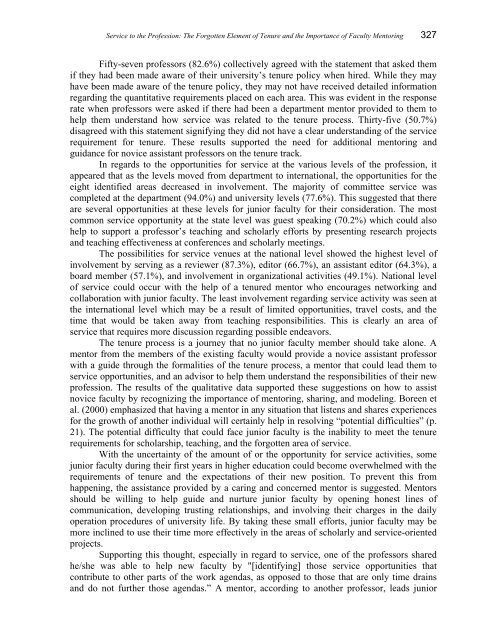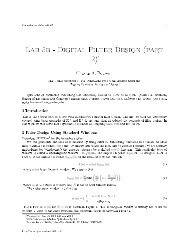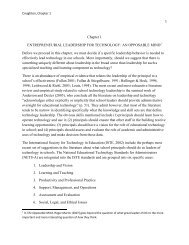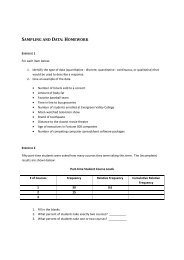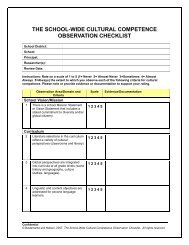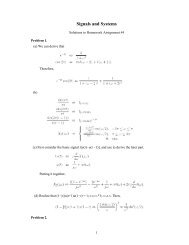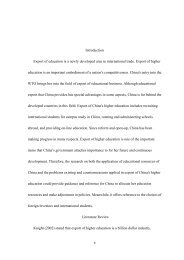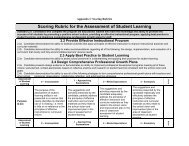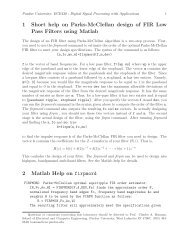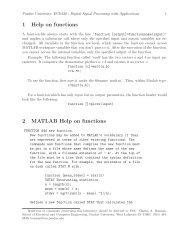Blazing New Trails - Connexions
Blazing New Trails - Connexions
Blazing New Trails - Connexions
You also want an ePaper? Increase the reach of your titles
YUMPU automatically turns print PDFs into web optimized ePapers that Google loves.
Service to the Profession: The Forgotten Element of Tenure and the Importance of Faculty Mentoring 327<br />
Fifty-seven professors (82.6%) collectively agreed with the statement that asked them<br />
if they had been made aware of their university’s tenure policy when hired. While they may<br />
have been made aware of the tenure policy, they may not have received detailed information<br />
regarding the quantitative requirements placed on each area. This was evident in the response<br />
rate when professors were asked if there had been a department mentor provided to them to<br />
help them understand how service was related to the tenure process. Thirty-five (50.7%)<br />
disagreed with this statement signifying they did not have a clear understanding of the service<br />
requirement for tenure. These results supported the need for additional mentoring and<br />
guidance for novice assistant professors on the tenure track.<br />
In regards to the opportunities for service at the various levels of the profession, it<br />
appeared that as the levels moved from department to international, the opportunities for the<br />
eight identified areas decreased in involvement. The majority of committee service was<br />
completed at the department (94.0%) and university levels (77.6%). This suggested that there<br />
are several opportunities at these levels for junior faculty for their consideration. The most<br />
common service opportunity at the state level was guest speaking (70.2%) which could also<br />
help to support a professor’s teaching and scholarly efforts by presenting research projects<br />
and teaching effectiveness at conferences and scholarly meetings.<br />
The possibilities for service venues at the national level showed the highest level of<br />
involvement by serving as a reviewer (87.3%), editor (66.7%), an assistant editor (64.3%), a<br />
board member (57.1%), and involvement in organizational activities (49.1%). National level<br />
of service could occur with the help of a tenured mentor who encourages networking and<br />
collaboration with junior faculty. The least involvement regarding service activity was seen at<br />
the international level which may be a result of limited opportunities, travel costs, and the<br />
time that would be taken away from teaching responsibilities. This is clearly an area of<br />
service that requires more discussion regarding possible endeavors.<br />
The tenure process is a journey that no junior faculty member should take alone. A<br />
mentor from the members of the existing faculty would provide a novice assistant professor<br />
with a guide through the formalities of the tenure process, a mentor that could lead them to<br />
service opportunities, and an advisor to help them understand the responsibilities of their new<br />
profession. The results of the qualitative data supported these suggestions on how to assist<br />
novice faculty by recognizing the importance of mentoring, sharing, and modeling. Boreen et<br />
al. (2000) emphasized that having a mentor in any situation that listens and shares experiences<br />
for the growth of another individual will certainly help in resolving “potential difficulties” (p.<br />
21). The potential difficulty that could face junior faculty is the inability to meet the tenure<br />
requirements for scholarship, teaching, and the forgotten area of service.<br />
With the uncertainty of the amount of or the opportunity for service activities, some<br />
junior faculty during their first years in higher education could become overwhelmed with the<br />
requirements of tenure and the expectations of their new position. To prevent this from<br />
happening, the assistance provided by a caring and concerned mentor is suggested. Mentors<br />
should be willing to help guide and nurture junior faculty by opening honest lines of<br />
communication, developing trusting relationships, and involving their charges in the daily<br />
operation procedures of university life. By taking these small efforts, junior faculty may be<br />
more inclined to use their time more effectively in the areas of scholarly and service-oriented<br />
projects.<br />
Supporting this thought, especially in regard to service, one of the professors shared<br />
he/she was able to help new faculty by "[identifying] those service opportunities that<br />
contribute to other parts of the work agendas, as opposed to those that are only time drains<br />
and do not further those agendas.” A mentor, according to another professor, leads junior


